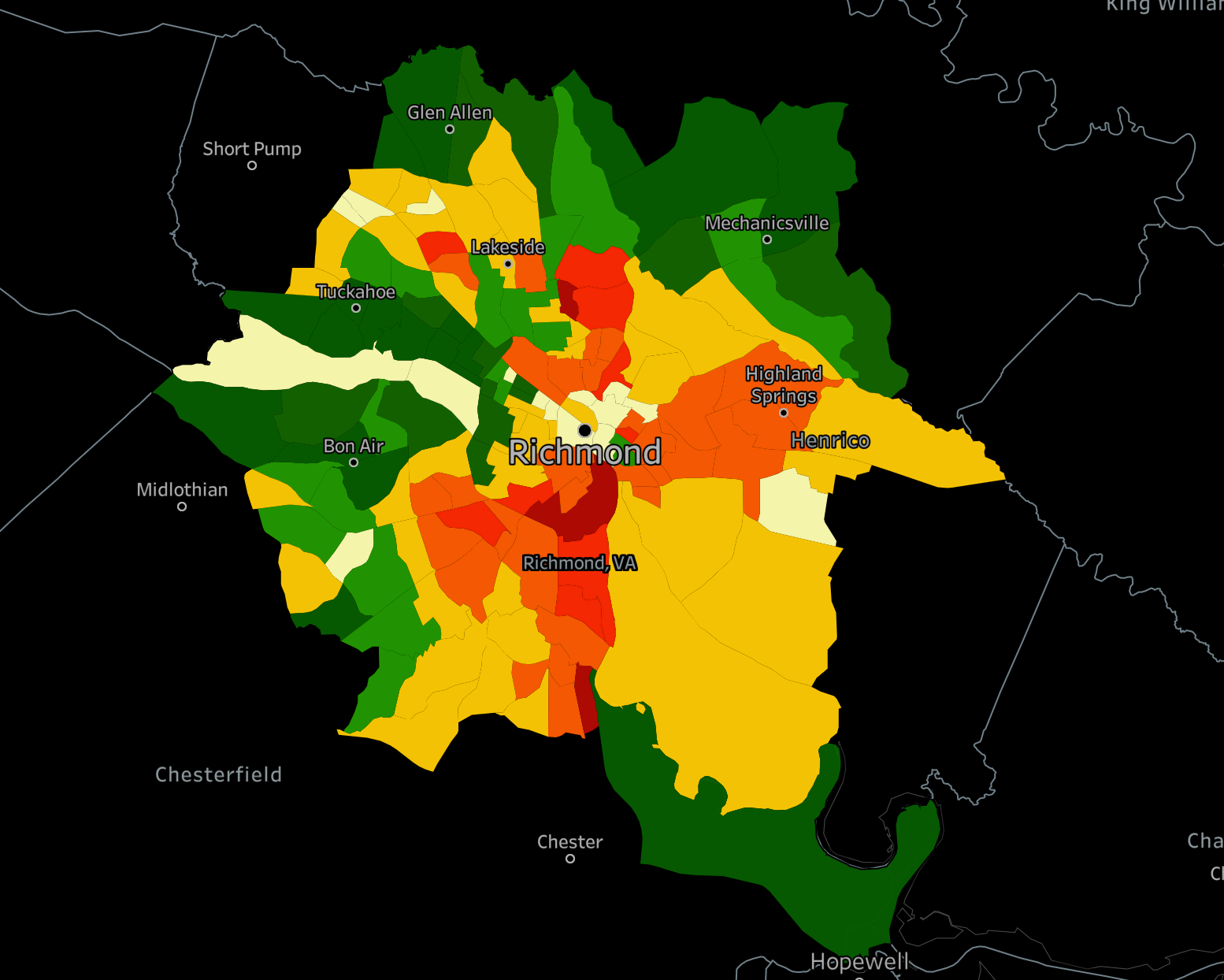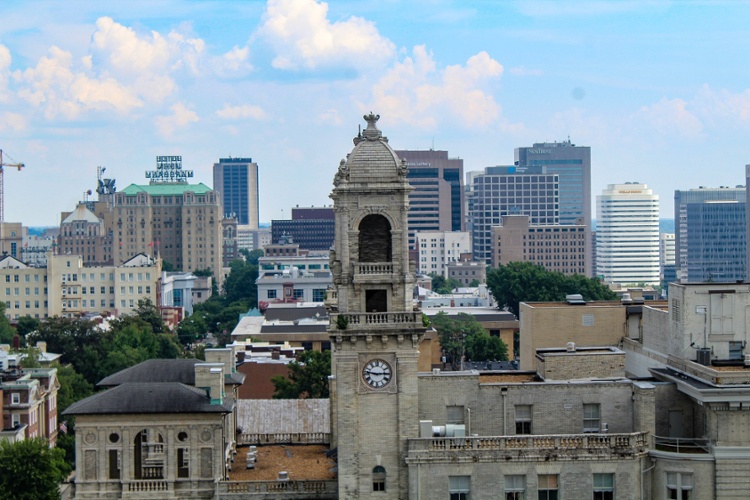According to an agent interviewed by NBC 12, there are “way too many buyers and not enough sellers” in Richmond, with some buyers paying for seller closing costs and paying anywhere from $40K to $160K over the asking price.
The city continues to be a seller’s market, with nice property at a decent price point generating multiple offers, and single-family homes under $400K are extremely difficult to find.
Richmond is the capital of Virginia and the 3rd-most populous metropolitan area in the state. Nicknamed the “River City”, Richmond was originally founded as a trading center in 1609 by English colonists and played a key role in the Revolutionary War and the American Civil War.
Today, Richmond has a thriving diverse economy driven by the financial, law, and government sectors. One of 13 Federal Reserve Banks and a U.S. Court of Appeals are located in Richmond.
The Richmond region has a well-deserved reputation as a great place to live, start a business, and grow a career. The city was recently rated as one of the best small cities in North America. Atlantic beaches, the Blue Ridge Mountains, and Washington D.C. are all within a two-hour drive of Richmond, Virginia.
Keep reading to learn why investors are considering the Richmond real estate market in 2022.
Population growth
An average of 32 people each and every day have moved to Greater Richmond over the past 10 years, boosting the metro population from 1.2 million in 2010 to more than 1.3 million today. The City of Richmond itself added more than 22,000 new residents over the last decade, with a population growth rate of nearly 11%.
Key Population Stats:
- Richmond is the 4th-largest city in Virginia with a population of over 226,000 in the city and more than 1.3 million in the Richmond metropolitan area.
- Over the last 10 years, the population of Greater Richmond has grown by more than 8%, while the city has grown by 11%, according to the most recent census.
- Median household incomes in Richmond increased 0.9% year-over-year, while median property values grew by over 2.0%.
- Metro area of Richmond includes the cities of Richmond, Colonial Heights, Hopewell, and Petersburg, along with the counties of Charles City, Chesterfield, Dinwiddie, Goochland, Hanover, Henrico, New Kent, Powhatan, and Prince George.
- Unemployment in Richmond is 2.8% (as of April 2022) while job growth last year was nearly 1.8%.

Job market
Downtown Richmond is home to over half of the jobs in the city, and has driven job growth over the past 20 years.
While downtown has a significant economic impact on the region, job growth in the suburbs is equally impressive. As Richmond.com recently reported, the job market in suburbs such as Midlothian and Lakeside are growing as well as more businesses and people move to Richmond.
Richmond – also known as the “River City” – has been described as flowing with job opportunities, according to one local news station. The city recently ranked as the 69th-best place to find a job in the U.S. this year and is one of the five best cities in Virginia for employment.
Key Employment Stats:
- GDP of the Richmond MSA is over $76.2 billion, according to the Federal Reserve Bank of St. Louis, and has grown by more than 16% over the last ten years.
- Job growth rate in Richmond is 2.0% year over year, while wages and salaries increased by 2.6%, according to the Federal Reserve Bank of Richmond (June 2022 snapshot).
- Median household income in the Richmond Metro area is $71,223 while per capita income is $39,237.
- Forbes ranks Richmond #55 as the best place for business and careers in the U.S.
- Key industries in Richmond include advanced manufacturing, creative & knowledge-based businesses, finance and insurance, real estate, green technology, health & life sciences, and transportation & logistics.
- Richmond is ranked as a top 10 city for global trade by Global Trade Magazine.
- Dominion Energy, WestRock, Universal Corporation, and NewMarket Corporation are four Fortune 500/1000 companies headquartered in Richmond.
- Top private employers in Richmond include Capital One Financial Corporation, VCU Health System, Dominion Virginia Power, SunTrust Banks Inc., Amazon.com, United Parcel Service, and the Federal Reserve Bank of Richmond.
- Major colleges and universities in Richmond include Virginia Commonwealth University, University of Richmond, Virginia Union University, and J. Sargeant Reynolds Community College.
- Over 90% of the residents in Richmond are high school graduates or higher, while nearly 38% hold a bachelor’s degree or postgraduate degree.
- Richmond is within a one-day drive of 55% of the nation’s population.
- Four major Interstate Highways and several major railroads pass through the Richmond metro area.
- The Central Business District is within 10 minutes of the Port of Richmond and the Richmond International Airport.
- Richmond International (RIC) served nearly 4.4 million passengers prior to the pandemic with major airlines such as American, Delta, United, Southwest, and JetBlue.
Real estate market
Homes in the Richmond metro area have spent an average of 6 days on the market since July 2020 before going under contract. According to the father-in-law of a buyer interviewed by The Washington Post, “They list it on Thursday, have an open house on Saturday, and it’s under contract on Monday.”
As with many other real estate markets in Virginia, the reason for rising prices is that there’s simply not enough supply to meet the growing demand for property in the Richmond metropolitan area.
Key Market Stats:
- Zillow Home Value Index (ZHVI) for Richmond is $327,746 through May 2022.
- Home values in Richmond have increased by 15.1% over the last year.
- Over the past five years home values in Richmond have increased by 65%.
- Median list price of a single-family home in Richmond is $325,000 based on the most recent report from Realtor.com (April 2022).
- Median listing price per square foot for a home in Richmond is $201.
- Days on market (median) is 41.
- Median sold price for a single-family home in Richmond is $335,000.
- Sale-to-list price ratio is 105.26%, which means that on average homes in Richmond are selling for about 5% over the asking price on average.
- Of the 120 neighborhoods in Richmond, Ginter Park is the most expensive with a median listing price of $647,000.
- Most affordable neighborhood to buy a home in Richmond is Jeff Davis, where the median listing price is $147,500.
Attractive renters’ market
Rents in metropolitan Richmond surged during the pandemic and show no sign of slowing down. In fact, rents have increased by 22% in two years. As one local real estate interviewed by 6 News Richmond observes, rising rents in Richmond are due to supply and demand, with more people moving to the city and the surrounding counties than ever before.
Even though Richmond is in the middle of a strong seller’s market, many homeowners are deciding to keep what they have and rent instead. As one suburban Richmond newspaper recently reported, people are becoming real estate investors instead by turning their homes into rental property that cash flows, so “they don’t have the need or desire to sell that property.”
Key Market Stats:
- Median rent in Richmond for a 3-bedroom home is $2,000 per month, according to the most recent report from Zumper (June 2022).
- Rents in Richmond have increased by 11% year-over-year.
- Over the past 3 years, rent for a 3-bedroom place in Richmond has increased by about 29%.
- Renter-occupied households in Richmond account for 56% of the total occupied housing units in the metropolitan area.
- Most affordable neighborhoods for renters in Richmond include Brookland Park, Deerbourne, and Chippenham Forest where rents average about $795 per month.
- Most expensive neighborhoods in Richmond for renters are Old Town Manchester, Monroe Ward, and The Fan where average rents range between $2,190 and $2,847 per month.
Historic price changes & housing affordability
Tracking the change in housing prices and monitoring the housing affordability index are two statistics real estate investors can use to forecast the potential performance of income property.
Every month Freddie Mac publishes a house price index (FMHPI) that measures the change in home prices for real estate markets in the U.S. The report assigns December 2000 with a benchmark of 100 and then compares the monthly change in housing prices in each state and metro area to 100.
The most recent FMHPI from Freddie Mac for the Richmond housing market shows:
- April 2017 HPI: 168.9
- April 2022 HPI: 257.9
- 5-year change in house prices: 52.6%
- One-year change in house prices: 14.4%
- Monthly change in house prices: 1.2%
Housing affordability is another metric real estate investors use to help decide how good a market is for rental property.
As a rule of thumb, markets where it is more expensive to buy a house – such as Richmond - usually see a higher percentage of renters.
The most recent report from Kiplinger’s Personal Finance surveyed home prices in the 100 largest metro areas. The survey uses an affordability scale of 1 to 10, with 1 being the more affordable market to buy a home in and 10 being the least affordable.
The affordability index report for Richmond shows:
- Since the last real estate cycle market peak in May 2006, home prices in Richmond have increased by 16.0%.
- Since the last real estate cycle market bottom in March 2012, home prices in Richmond have increased by 59.6%.
- Richmond has an affordability index of 7 out of 10, meaning that Richmond is one of the least affordable markets to buy a home.
Quality of life
Richmond is ranked by U.S. News & World Report as among the best places to live and retire in the country. The Richmond metro area receives high ratings for value, desirability, job market, and overall quality of life.
Key Quality of Life Stats:
- Cost of living in Richmond is 3.5% below the national average, according to the Greater Richmond Partnership.
- Richmond receives high rankings from Niche.com for outdoor activities, commuting, and nightlife.
- Inc.com lists Richmond as one of 13 “Major U.S. Cities Where You Can Live Well on Less Than $50,000 a Year.”
- WalletHub ranks Richmond as one of the best places to start a career, while the Wall Street Journal says Richmond is in the top 20 cities where people can find a job.
- Wide variety of lifestyle and housing options in Richmond include city and suburban living, renovated warehouse apartments, historic townhomes, and waterfront communities.
- Climate in Richmond is humid subtropical with hot, humid summers and moderately cold winters.
- Virginia Museum of Fine Arts, Richmond Symphony, and the American Civil War Museum are just a few of the countless cultural attractions in Richmond.
- Richmond is just a short drive to the University of Virginia, Washington D.C.-Baltimore, and Hampton Roads along the Virginia Coast.
Get Out the Map
Where to begin your search? Roofstock created a heat map of Richmond based on our Neighborhood Rating, a dynamic algorithm that enables you to make informed investment decisions by measuring school district quality, home values, employment rates, income levels, and other vital investment criteria.

DARK GREEN: 4-5 star neighborhood
LIGHT GREEN: 3.5-4 star neighborhood
YELLOW: 2.5-3 star neighborhood
ORANGE: 2 star neighborhood
RED: 1 star neighborhood
Ready to invest in the Richmond housing market? If you haven't already done so, create your free Roofstock account and set up alerts. We'll notify you when we have a Richmond, Virginia investment property that matches your search criteria.









